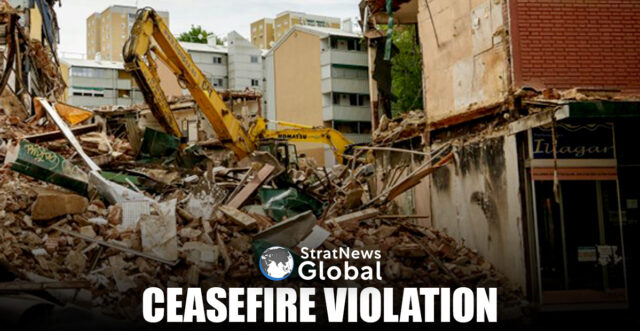Myanmar‘s anti-regime forces claimed that despite declaring a temporary ceasefire on Wednesday after the recent deadly earthquake, the military junta continues air and ground attacks.
The junta announced a three-week ceasefire in civil war-torn Myanmar amid growing criticism of the junta’s military operations across the nation during the post-earthquake search and rescue efforts.
“Out of compassion for the earthquake-affected people and to facilitate swift humanitarian and reconstruction operations, the Tatmadaw hereby declares a temporary ceasefire from April 2-22,” the junta said in a statement as quoted by Myanmar Now.
Kachin Independence Army (KIA), an opponent of the junta regime, reported airstrikes and ground offensives in several areas of the country.
“We saw that they released a ceasefire statement. However, the fighting hasn’t stopped,” group’s spokesperson Col. Naw Bu was quoted as saying by Myanmar Now.
“The airstrikes in Bhamo started yesterday and continued until around 6:30 this morning,” he said.
Asked about how the KIA’s response, he said: “If they attack, of course, we will defend ourselves by fighting back. So we expect there will be more fighting.”
Call For Immediate Aid
Amid ongoing military airstrikes and growing humanitarian needs following last week’s 7.7 magnitude earthquake in Myanmar, the UN has intensified calls for immediate, unhindered aid access to assist millions affected by the disaster.
Despite the military’s announcement of a ceasefire, attacks have continued across the country, exacerbating an already dire situation, UN human rights chief Volker Türk warned on Friday.
“In the days following the deadly earthquake that tore through central Myanmar last week, the Myanmar military continued operations and attacks, including airstrikes – some of which were launched shortly after tremors subsided,” said Ravina Shamdasani, spokesperson for the High Commissioner for Human Rights.
“We urge a halt to all military operations and for the focus to be on assisting those impacted by the quake,” she told journalists in Geneva, reiterating Mr. Türk’s call for an “inclusive political solution” to end more than four years of fighting sparked by the junta’s February 2021 coup d’état.
61 Attacks Reported Since Earthquake
Latest data from the UN human rights office, OHCHR, points to at least 61 reported attacks across Myanmar since the disaster happened, including 16 since the ceasefire announced by the military was supposed to take effect on April 2.
A broad coalition of opposition armed groups has declared a temporary truce on offensive operations to facilitate emergency aid.
A broad coalition of opposition armed groups have declared a temporary truce on offensive operations to facilitate emergency aid.
The tactics of the military – known as the Tatmadaw in Myanmar – include using near-silent adapted paragliders to bomb communities, said James Rodehaver, Head of OHCHR’s Myanmar team:
“What those are is an individual military operative who uses a hang-glider with a backpack attached to his back or to his torso with a large fan on it, and he uses that to essentially paraglide using the fan as a motor over areas and drop hand-held bombs or munitions onto targets below.”
UN Relief Chief In Myanmar
Against this backdrop, the UN Emergency Relief Coordinator, Tom Fletcher, arrived in Myanmar on Friday to assess the scale of devastation and meet survivors and aid workers.
After briefings with humanitarian teams in Yangon, Mr. Fletcher travelled to Myanmar’s second largest city, Mandalay, near the epicentre of the quake, where 80 per cent of the buildings are estimated to have collapsed.
There, he met with frontline humanitarians and community organizations who have been leading earthquake response, applauding their “courage, skill and determination”.
“Many themselves lost everything and yet kept heading out to support survivors,” he said in a post on social media.
Security Council Urges Access
The UN Security Council issued a press statement on Friday reiterating the importance of a safe and conducive environment to ensure the timely and effective delivery of lifesaving assistance to all those in need, without disruption or discrimination.
“The members of the Security Council recognised the need to strengthen rescue, relief, and recovery efforts and to scale up immediate and rapid humanitarian assistance in response to the requests to help the people of Myanmar, supported by the international community,” the statement said.
They also expressed their gratitude and support for the work of the Association of South-East Asian Nations (ASEAN), UN agencies and the wider international community, including the swift provision of urgent life-saving assistance, rescue, and disaster relief.
Humanitarian Response Ramps Up
Immediately after the 28 March earthquake, which struck just before 1 PM local time, UN agencies deployed teams to affected areas, delivering critical aid to tens of thousands of families and assessing the damage.
More than 25 search-and-rescue teams are in the field, medical teams have been deployed, and essential aid – including water and shelter kits – is being distributed across impacted regions. On Thursday alone, 30 tons of medical supplies arrived in Myanmar, bringing the total delivered so far to 100 tons.
The UN refugee agency (UNHCR) has also provided plastic sheets and kitchen sets for 25,000 people and is mobilizing additional supplies for another 25,000 people from its existing stockpiles.
(With inputs from IBNS)





